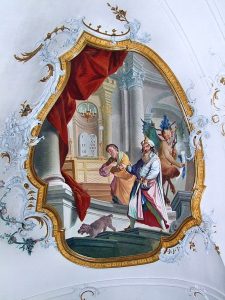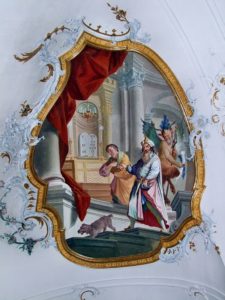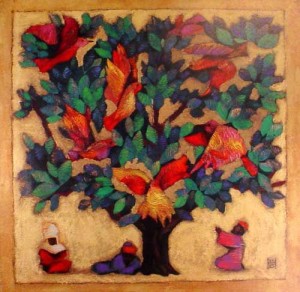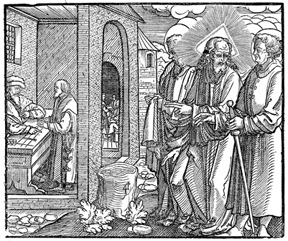Illuminations on the Lectionary readings for Oct. 26, 2025 (Pentecost 20C/Proper 25)

Pharisäer und Zöllner (The Pharisee and the Publican), baroque fresco in the Basilika Ottobeuren, a Benedictine abbey in Ottobeuren, Germany, near the Bavarian Alps. (Click image to enlarge.
First Reading (Track One): Joel 2:23-32
A persistent message of hope is heard throughout Sunday’s readings. We hear it in the words of the Prophet Joel, whose short but poetic prophecy offers comfort and hope amid the threat of a locust plague that threatens famine: God is with us. Feast will follow famine. God loves us, and the spirit will pour out on us as rich and bountiful harvests. Even Joel’s alarming visions of blood and fire and columns of smoke, darkened sun and bloody moon hold no fear for those who call on the name of the Lord, Joel declares: They will all be saved.
First Reading (Track Two): Sirach 35:12-17
The book of Sirach – later renamed Ecclesiasticus in the time of the Emperor Constantine – is one of the books known as Apocrypha that come at the end of the Old Testament. It sums up God’s teaching in the brisk, memorable style of biblical wisdom literature. This passage envisions God as judge over all, a judge who is impartial in dispensing justice. Even so, this divine judge pays special attention to the needs of those who have been wronged, to widows and orphans, to the oppressed who come before the judge with complaints.
Alternate First Reading (Track Two): Jeremiah 14:7-10,19-22
Throughout Scripture, prophets are rarely reluctant to argue with God. The notion of mere mortals pushing back against God Almighty might seem counterintuitive, but it is a powerful way for a prophet to emphasize that the subject is important. Setting the tone of hope amid pain that runs through Sunday’s readings, Jeremiah acknowledges that the people have done wrong. But then he contrasts this admission with a powerful argument that the loving God who made covenant with the people at Sinai would surely not fail to bring them back home, even if they wandered and sinned.
Psalm (Track One): Psalm 65
Psalm 65 offers thanksgiving for Earth’s bounty. It serves us doubly in this autumn season: First, it echoes Joel’s assurances that God will provide us nature’s rich harvests even after times of trouble and sin. Then it also paints a lovely word picture of God’s great outpouring, valleys and hills cloaked with crops and grain and shouting and singing for joy. Hold these images in our thoughts as Thanksgiving and Christmastide draw near.
Psalm (Track Two): Psalm 84:1-6
Mustering poetic metaphors about birds finding safety in their nests, the Psalmist sings a hymn of trust and praise in a loving God who will protect the people and lead them home. God will watch over, favor and honor those who trust in God. As God provides nests for the small birds, so will God provide for us. As God makes pools of water available for thirsty travelers, so will God hear our prayers.
Second Reading: 2 Timothy 4:6-8, 16-18
The Letter to Timothy concludes by imagining Paul’s last testament in beautiful, poetic words that ring through the ages. The assurance that Paul had fought the good fight, finished the race, and kept the faith while undergoing trials and imprisonment would have been a source of strength to the people of a young church facing Roman persecution. Although some believers were deserting the cause in fear, this letter called on Christians to stand strong, proclaim the good news to all the nations, and count on God’s strength and God’s protection.
Gospel: Luke 18:9-14
This parable follows immediately after last week’s story about the corrupt judge and the persistent widow. It is helpful to think about these parables together to understand what Jesus wants us to know about prayer. Like the powerful but corrupt judge who fails to prevail against the fierce widow, the Pharisee tripped over his pride. Take note that he was not exaggerating his virtues. He truly did follow the law, pray, fast, and tithe. But the despised tax collector who stood aside, looked down, beat his breast and begged for mercy as a sinner was the one who went home justified, Jesus said, because he brought humility to his prayer.




